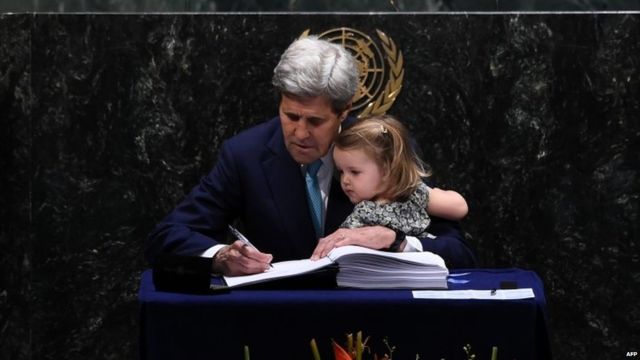 Credit: BBC
Credit: BBC
Reaffirming the Paris Agreement
This June will mark the 2nd anniversary of the U.S. pull out from the Paris Agreement. At the time, ASP expressed deep disappointment. Today, we maintain our concern that the action “impacts the security and stability of our nation; signaling to the rest of the world that the U.S. has turned its back on its global responsibilities.” Further, studies show that the Paris Agreement could boost the world economy by $19 trillion and over 360 companies including Starbucks, General Mills, and Hewlett Packard urged President Trump to remain in the Agreement. By leaving the Agreement, the U.S. is going directly against business and national security interests.
The past year demonstrated the full threat of failing to address climate change. In September 2018, Hurricane Florence decimated Camp Lejeune Marine Corps facility and caused damage to Fort Bragg and communities across North Carolina. Over thirteen thousand personnel were deployed to respond to the crisis. Only a few weeks later, Hurricane Michael leveled Tyndall Air Force Base on Florida’s Panhandle. Current estimates suggest that Camp Lejeune sustained over $3.6 billion worth of damage and the Air Force recently requested an initial $5 billion to rebuild Tyndall Air Force Base and respond to recent severe flooding at Offutt Air Force Base in Nebraska. If the U.S. fails to lower greenhouse gas emissions, these incidents will only increase in frequency, undermining our readiness and lethality.
Fortunately, there have been efforts to encourage the U.S. to reaffirm its commitment to lowering emissions through agreements like the Paris Agreement and addressing the national security risks of climate change. One of the efforts is the Climate Action Now Act, introduced into the House of Representatives by Rep. Kathy Castor (D-FL) and passed the House on May 2nd, 2019. The Climate Action Now Act (H.R.9),
“requires the President to develop and update annually a plan for the United States to meet its nationally determined contribution under the Paris Agreement on climate change. Specifically, the plan must describe steps to (1) cut greenhouse gas emissions by 26%-28% below 2005 levels by 2025, and (2) confirm that other parties to the agreement with major economies are fulfilling their announced contributions. In addition, the bill prohibits federal funds from being used to withdraw from the agreement.”
While the Paris Agreement will not solve climate change, it is an important first step. Climate change is a global threat and requires global solutions. Further, the rest of the world looks to the U.S. for leadership and when the U.S. left the Paris Agreement, the U.S. ceded leadership. Countries like China are all too happy to take over that role. If the United States wishes to remain a leader on the global stage, it must begin to address the root causes of climate change and prepare for the inevitable consequences that are already “baked in.”





